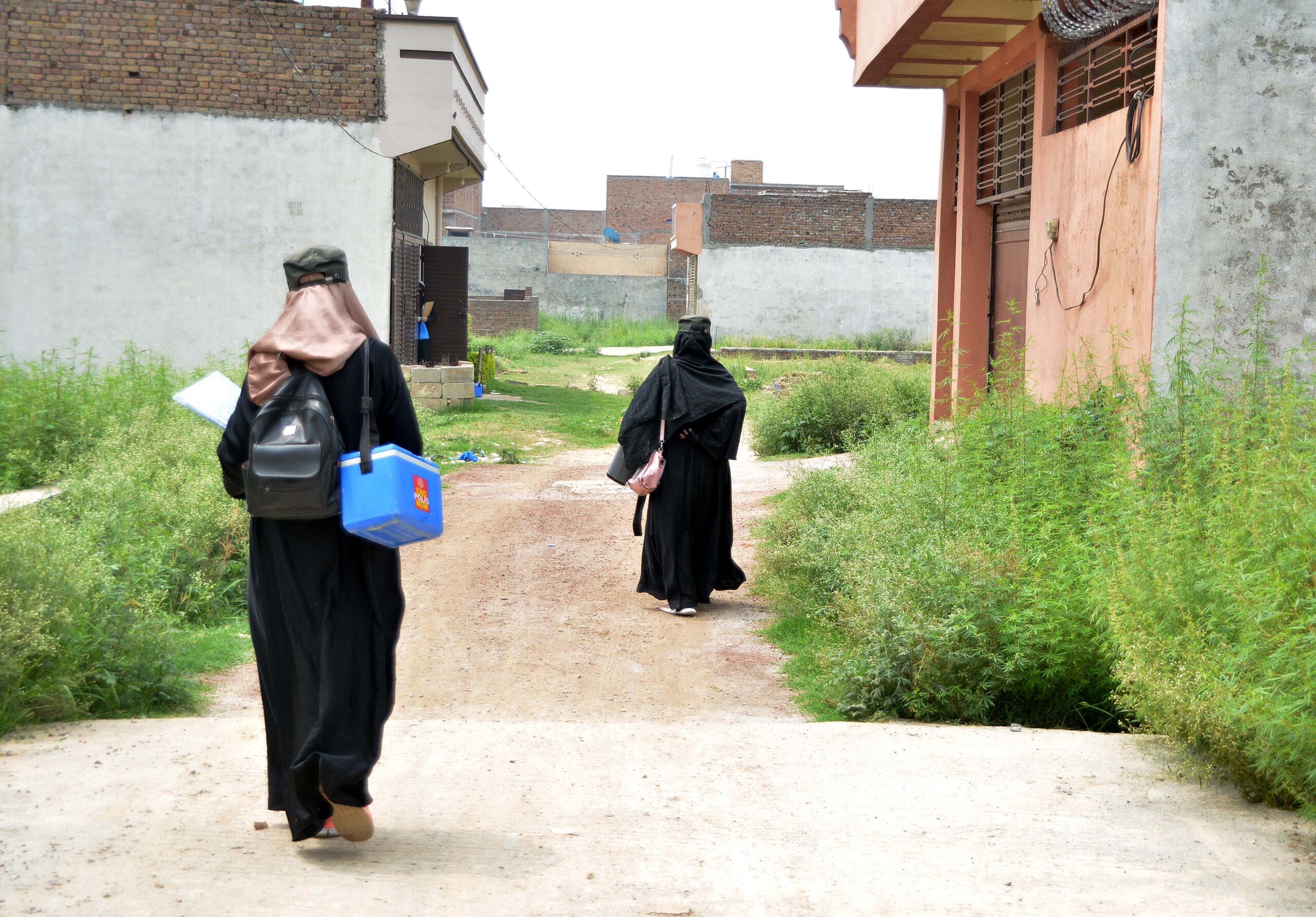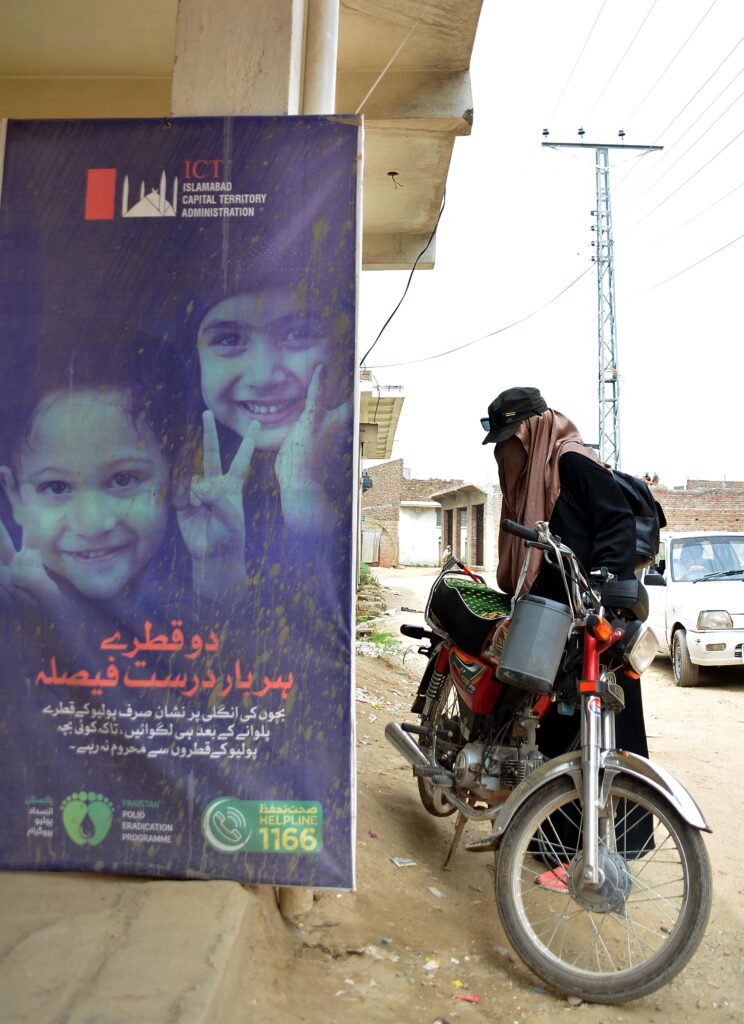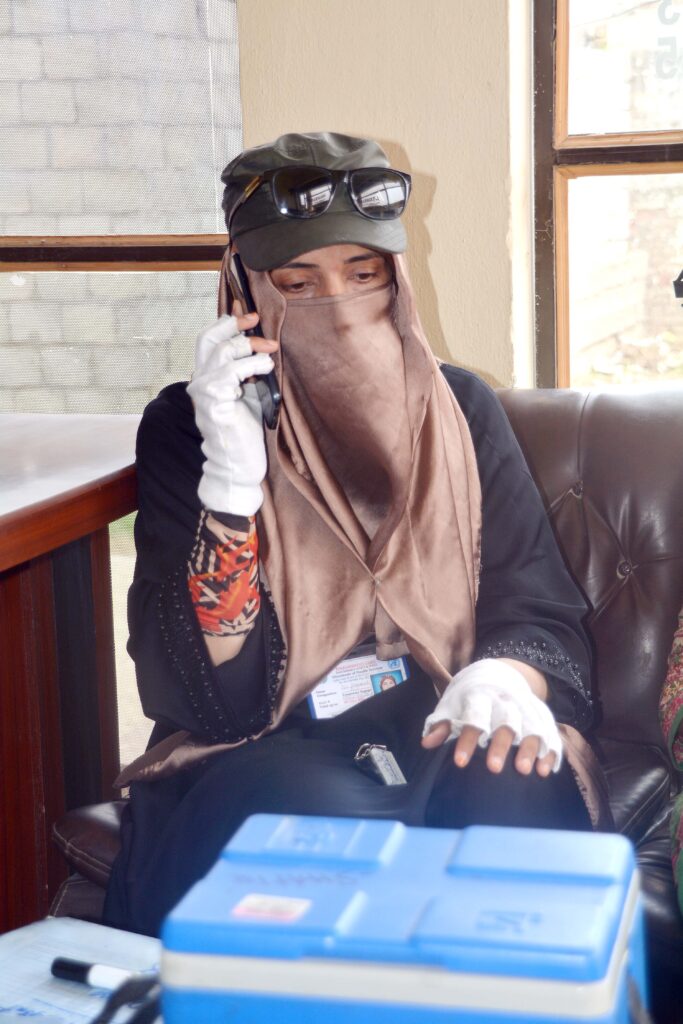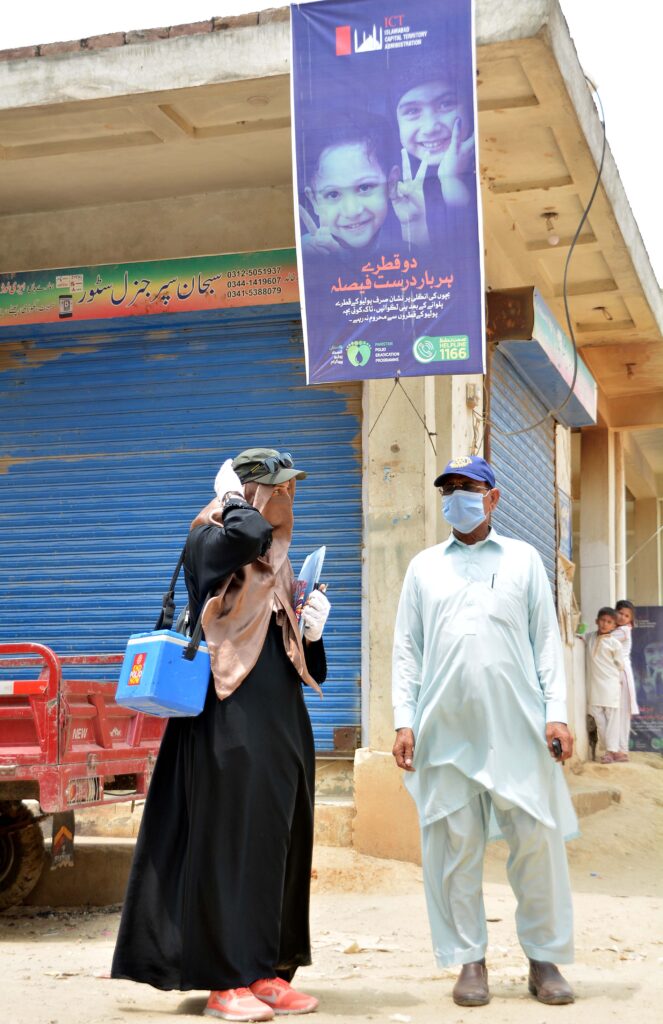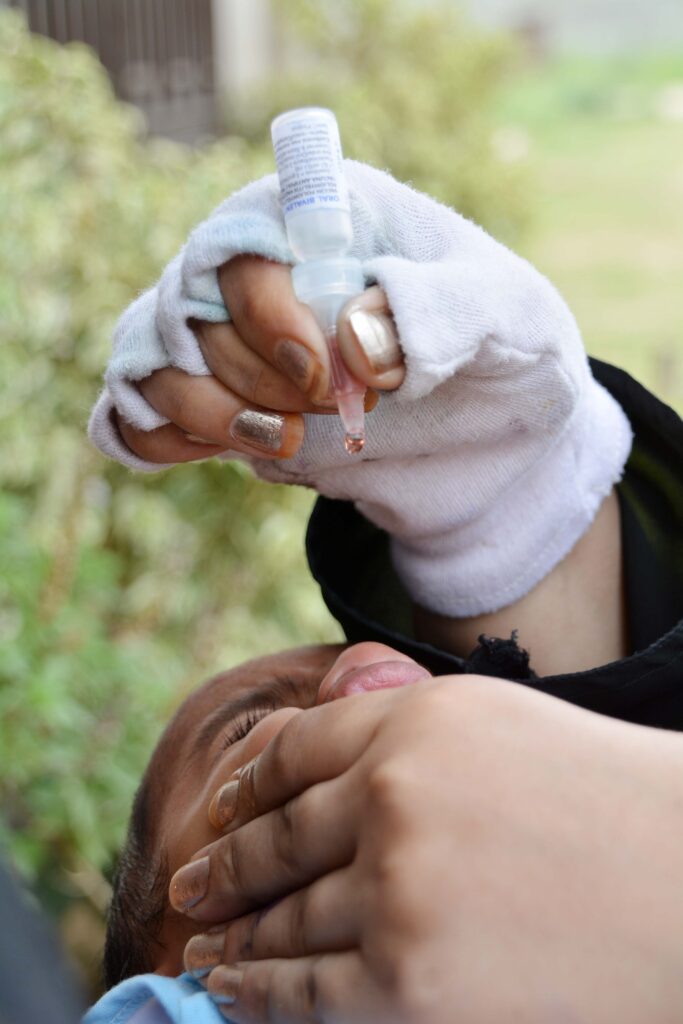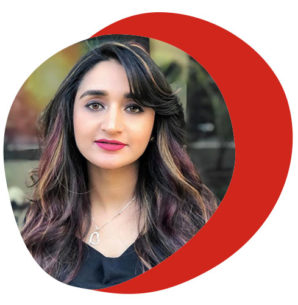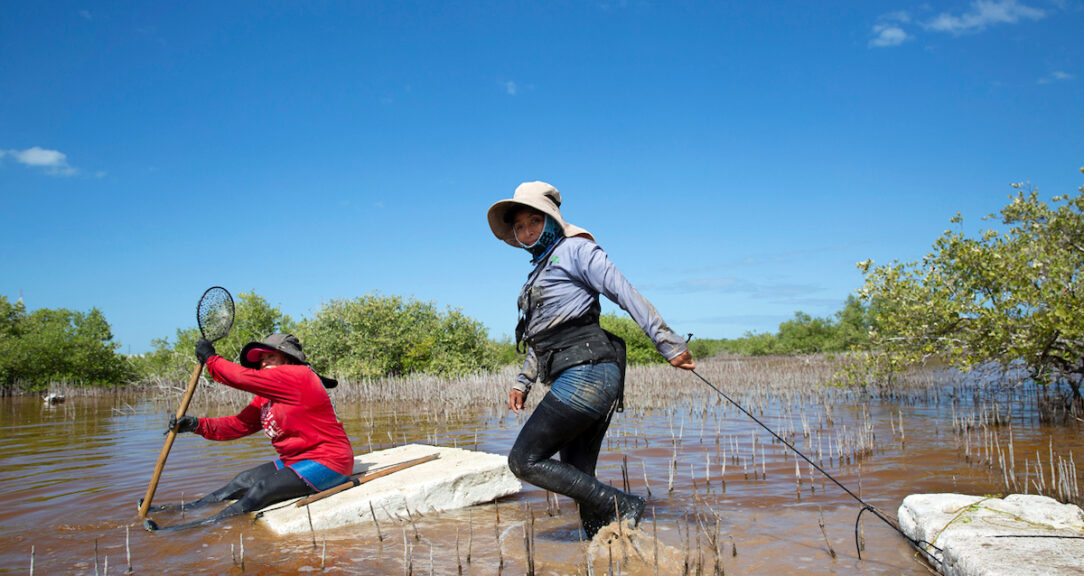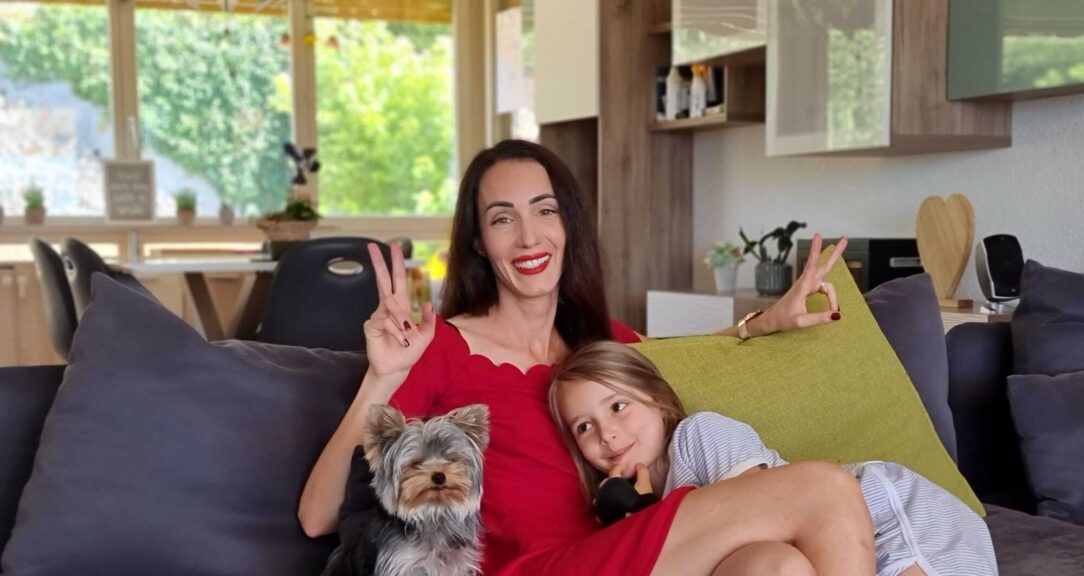On a hot summer day in Jhangi Saiyidan — a village next to Pakistan’s capital, Islamabad — Musarat Durani and her team, carrying ice-filled boxes with vials of the polio vaccine, are knocking on doors.
Durani and the other women are sweating profusely. Today, they are trying to meet with families who have previously refused the vaccine for their children. Pakistan is one of only two countries in the world where polio is endemic, meaning consistently present.
At 35 degrees celsius, clad in a black burka, Durani works for eight to nine hours every day during each week-long campaign to vaccinate children at their doorsteps. Three national campaigns have been conducted in Pakistan since January this year, along with targeted ones in high-risk areas via the Pakistan Polio Programme (PPP).
The first polio drops were administered in 1994 to then-prime minister Benazir Bhutto’s youngest daughter, Aseefa Bhutto Zardari. Since then over $5 billion has been spent towards eradicating polio in Pakistan, and over $17 billion globally.
These polio vaccination campaigns have faced many challenges in Pakistan. Apart from working in the blazing sun, polio workers encounter often life-threatening hurdles. They are sometimes accompanied by police security to protect them against anti-vaxxers. Durani is one of the vaccine workers who puts her life on the line for the future of Pakistan’s children.
A passion for social work
Born in 1990, Durani is one of six daughters. She spent her early childhood in Quetta, Balochistan, in the southwestern region of Pakistan. Her family soon moved to Peshawar in the northwestern region of Khyber Pakhtunkhwa, often called KP, because of the worsening security conditions in Quetta.
Durani has more than a decade of experience as a polio social worker, in three major cities in Pakistan across two provinces.
The job fascinated her since she was in high school. She saw women and girls working tirelessly, going door to door in her neighborhood, giving the drops to children. “I thought, ‘This is such a wholesome job, to help people, do good deeds and save the country from an incurable disease,’” she remembers.
She started volunteering when she was 15, with encouragement and support from her family. “They would call me brave and smart, complimenting me for my slightest initiatives,” she says.
Back in 2010, when Durani started working, polio campaigns were conducted every three months in Pakistan; higher risk areas are targeted monthly. She realized she enjoyed the process and felt gratification. “(Other girls) complained of fatigue, body aches, misbehavior by anti-vaxxers, but it delighted me,” she says.
Her mother and sisters have also been polio workers at various points in their lives. In 2012, Durani got married and within a year gave birth to triplets. Then her husband passed away due to a chronic disease six years later.
Her late husband had never discouraged her from working, and with his support of her work, she was able to continue working while raising her family. Durani is now the sole breadwinner for her children and mother from her occasional earnings as a polio health worker.
The workers for the PPP, who are paid by WHO, are tasked with immunizing as many of Pakistan’s 41.5 million unvaccinated children under 5 as they can. The government recruits and trains the 338,000 frontline workers, of which 62% are women and all of whom are part-time at most. A regular worker earns about 13,000 Pakistani rupees (PKR, about $57) per campaign and the area manager 20,000 PKR ($87) for five to seven days of work per month. The minimum wage in Punjab and Islamabad is currently 19,870 PKR per month.
The process to become a polio worker is straightforward: One applies at the government health department, appears for a test and enrolls in the program. Because Durani has been working as a polio worker for over a decade, she has risen the ranks to become an area manager.
The polio workers are tasked with immunizing Pakistan’s 41.5 million unvaccinated children under 5.
Her duty includes not only vaccinating children but also managing a team of four or five women, mapping the children who have been missed, keeping the team safe and providing logistics.
In the past, Durani would cover her entire area, which includes about four villages, on foot, running from one end to the other to help her team. It took a toll on her body: “I have fainted many times due to dehydration,” she says.
To improve her response time, Durani took matters into her own hands and learned how to ride a motorbike about two years ago. It is a rare sight to see a woman riding a two-wheeler in Pakistan, especially in the conservative area Durani hails from.
“I always wished I could fly to the locations where I am needed, and increase my speed of work,” she says with delight. “That has become possible after learning to ride a bike. It has made me more independent.”
Laying down lives to save the future
Apart from working in extreme conditions and receiving minimum wage, polio work in Pakistan is a high-risk, life-threatening job. About 53 polio-related fatalities have been recorded in Pakistan from 2012 to 2022, of which 37 were frontline workers, according to PPP. In 2022, one polio health worker and three policemen were shot in the country’s northwest.
Durani believes that only brave people can become frontline health workers. “Look at army officers or police officers — anything can happen to them anytime. They are playing with their lives, too,” she says. “Do people stop enrolling in these fields? If all of us remain scared and sit at home, who will resolve the issues?”
Durani started facing some heat early on in her career. Some people in her area who refused the vaccine threatened her family. “They wanted me to mark the kids without giving them the drops, to which I didn’t agree. I have always been sincere to my work,” she says.
Polio workers mark the fingers of children who have been vaccinated with a permanent marker. It is, however, a common sight to see children marked without receiving the vaccine, which is illegal.
“If all of us remain scared and sit at home, who will resolve the issues?”
Musarat Durani
The World Health Organization set a challenge in 1988 to eradicate polio worldwide. At the time, polio was endemic in 125 countries with about 350,000 cases reported in 1988. As of 2021, polio is endemic in just two countries — Pakistan and Afghanistan — with only six cases reported in 2021. The oral polio vaccine, commercialized in 1961 in the United States, helped eradicate the disease, which affects children under age 5 most severely and can cause paralysis and sometimes death.
Anti-vaccination campaigns have become rampant in the country, especially in conservative areas like KP. Some hard-line religious leaders and politicians believe that vaccinations are a western conspiracy and against the rules of Islam. Recent skepticism stems in part from the fake vaccination campaigns that were held in 2011 to track Osama bin Laden.
For Durani, areas like Peshawar and Quetta are difficult as some people are set in their ways and won’t listen to reason. She has heard them repeat falsehoods like that polio vaccines cause infertility and are meant to reduce the population.
In areas with high refusal rates, polio workers are sometimes accompanied by police officers. WHO’s poliovirus emergency committee reported in June 2022 that community resistance has contributed to an increase in polio cases across the country. About 2% of people in Pakistan refuse the vaccination, which leads to further spread of polio.
Durani says Pakistanis in general are very cooperative, and those who initially refuse are often convinced by police officials or local leaders. The houses that refuse polio vaccines are noted, and repeat offenders are visited by police, who explain how dangerous polio is. “The government is trying its best. It is the people’s mindset that is the issue.”
Looking for respect
The anti-vaccine propaganda has resulted in a number of fatalities of polio workers, police and children.
Durani recalls that during a campaign in KP, protesters burned down a health facility during a national polio campaign. “When the drive was completed, rumor mills started that kids were dying due to the polio vaccine,” she says. When news reached the area Durani was working in, the polio workers faced chaos. “People started refusing more and throwing stones at us. They blamed us for the (rumored) deaths of children. It was a very hot summer day, and we were met with a lot of hatred.”
Durani has also witnessed the deaths of colleagues. About four years ago, an unknown man shot directly at a colleague of hers, killing the 20-year-old and her mother. Nevertheless, Durani and her team completed the campaign.
Durani has also been directly targeted for her work. In June, during a campaign, children pelted her with stones. Their parents refused to get them vaccinated and encouraged the children to “beat them away.” She says: “My hands and feet are still swollen from the stones. We tried to explain, yet they didn’t listen.” Local leaders later intervened to explain and try to convince the family, which was still adamant not to vaccinate.
Finally, the police stepped in, saying that they could file charges against the family for stoning the polio team, but that getting vaccinated was the easier route. “They later took the vaccine and apologized, also. I told them that I am a mother and would not hurt other children,” Durani says.
Durani believes polio workers aren’t given the due respect that frontline workers deserve. “We are only trying to help and do not gain any benefit if the children are bedridden in the future,” she says. “Even a single handicapped child makes the future of the country unstable.”
Read more
Sign up to keep up to date with ReThink Q.
